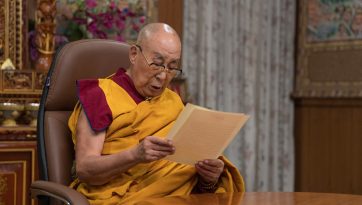21 US Senators urge Secretary of State to encourage China to solve Tibet issue
Twenty-one US Senators have written to Secretary of State John F. Kerry, urging him to make Tibet an integral issue when he visits China on 13 April. The letter was signed by Senator Mark E.Udall, Senator Marco Rubio, Senator Dianne Feinstein, Senator Micheal F. Bennet, Senator Richard Blumenthal, Senator Barbara Boxer, Senator Benjamin L. Cardin, Sanetor William M. Cowan, Senator Richard J. Durbin, Senator Al Franken, Senator Mike Johanns, Senator Mark Kirk, Senator Patrick J. Leahy, Senator John McCain, Senator James E. Risch, Senator Bernard Sanders, Senator Tom Udall, Senator Elizabeth Warren, Senator Ron Wyden, Senator Susan M. Collins, and Senator Jeff Merkeley.
Below is the full text of the letter:
United States Senate
Washington, DC 20510
April 11, 2013
The Honorable John F. Kerry
Secretary of State
Department of State
2201 C St. NW
Washington, D.C. 20520
Dear Secretary Kerry,
We are writing to ask for your commitment to press for meaningful improvements in the conditions in Tibet, both based on your personal interest in the issue and building on the grounds laid by your predecessors.
During your service on the Senate Foreign Relations Committee, the panel approved a number of policy and programmatic measures that serve to establish and broaden the U.S. government’s policy on Tibet. These efforts not only helped to provide critical assistance to Tibetans struggling to preserve their culture and identity, but also to promote a negotiated solution through dialogue. We appreciate your personal engagement on the Tibet issue and His Holiness the Dalai Lama, whom you hosted twice as Chairman, as well as the elected prime minister of the Tibetan community in exile, Sikyong Lobsang Sangay.
The situation in Tibet is at a crisis point. We are witnessing a cycle of repression, protest, and further repression, which threatens to escalate into further instability. We welcome the State Department’s call on the Chinese authorities to end the counter-productive policies that are stoking the grievances that are leading to Tibetans taking their own lives through self-immolations. We share the State Department’s hope that the acts of self-immolations will end, and we commend the Tibetan exile leadership led by Sikyong Lobsang Sangay for consistently and categorically discouraging Tibetans in Tibet from self-immolating as a form of protest.
Unfortunately, the Chinese government has failed to respond to the calls for a change in its policies towards Tibet and to respect the rights and dignity of Tibetans. In fact, by commencing prosecutions of Tibetans allegedly associated with acts of self-immolation, Chinese authorities are making things worse.
We view the Tibet problem as a resolvable issue. While the Chinese government’s external stance on the Tibet issue conveys intransigence,there are still hopes that dialogue could resume between China’s new regime – led by Xi Jinping, whose father had ties to the Dalai Lama- and Tibetan representatives. Moreover, there is an open discourse among a range of Chinese scholars and ‘netizens’ about the wisdom of the government’s approach. Lastly, Tibetans have adhered to the non-violent approach of the Dalai Lama, and the Tibetan exile leadership led by Sikyong Lobsang Sangay remains committed to dialogue. All of this suggests there is room for engagement with the Chinese.
We welcome the statement on Tibet by the United Nations High Commissioner for Human Rights Navi Pillay, made in November 2012. She cited “ continuing allegations of violence against Tibetans seeking to exercise their fundamental human rights of freedom of expression, association and religion,” and pointed to “reports of detentions and disappearances, of excessive use of force against peaceful demonstrators, and curbs on the cultural rights of Tibetans.” The UN High Commissioner’s statement brings important focus to the Tibet issue, as her office and her mandate reflect an objective assessment of the situation in Tibet through the application of fundamental and universal human rights norms.
We believe that Ms. Pillay’s statement can serve as an impetus for a new level of collaborative engagements on the Tibet issue. We noted that in December 2012, the European Union, United Kingdom and Canada issued statements on Tibet. Also, on December 11 ,2012, then-Special Coordinator for Tibetan issues Under Secretary Maria Otero cited Tibet as an example of U.S-EU strategic engagement on Asia, saying “ European governments, including Germany, UK, Switzerland, the Czech Republic, and Poland, have joined the call for Chinese authorities to address the worsening human rights conditions in Tibetan areas.”
In this context, we urge you to:
-
make Tibet an integral issue in your engagement with your Chinese counterparts, not only as consistent with the work of your predecessors and U.S policy, but as an expression of a principled foreign policy grounded in fundamental and universal values;
-
urge the Chinese government to resume meaningful dialogue with the Tibetan leadership;
-
appoint a new Special Coordinator for Tibetan Issues as soon as practicable
-
continue to fund the programs that provide humanitarian assistance, economic development, and independent information to the Tibetan people;
-
coordinate with other governments on implementation of the recommendations made by UN High Commissioner Navi Pillay, including allowing access by independent and impartial monitors (such as UN Special Rapporteurs) to assess conditions on the ground, adoption of policies recommended by UN Special Rapporteurs as referenced in Ms. Pillay’s statement, and lifting restrictions on media access to the region.
-
Seek access by U.S. diplomats to Tibetan areas as reciprocally commensurate with the access Chinese diplomats have in the United States; and
-
continue to make a consulate in Lhasa a top priority for the next diplomatic posts in the People’s Republic of China.
While the more than 100 self-immolations of Tibetans continue to make headlines, we know that there are countless others among the six million Tibetans inside Tibet who struggle silently every day to preserve their culture, their religion, and their dignity in the face of destructive Chinese policies. The United States has a moral responsibility to help the Tibetan people in this quest. We know that you understand the longstanding basis for America’s support of Tibet, and we welcome your continued efforts in this regard in your new role as Secretary of State.
Sincerely,
Senator Mark E.Udall
Senator Marco Rubio
Senator Dianne Feinstein
Senator Micheal F. Bennet
Senator Richard Blumenthal
Senator Barbara Boxer
Senator Benjamin L. Cardin
Sanetor William M. Cowan
Senator Richard J. Durbin
Senator Al Franken
Senator Mike Johanns
Senator Mark Kirk
Senator Patrick J. Leahy
Senator John McCain
Senator James E. Risch
Senator Bernard Sanders
Senator Tom Udall
Senator Elizabeth Warren
Senator Ron Wyden
Senator Susan M. Collins
Senator Jeff Merkeley




